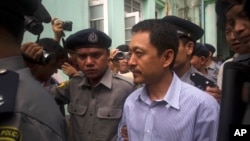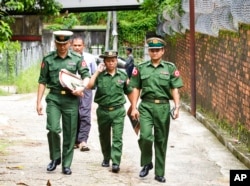A journalist is among four people detained by Myanmar's military this month over social media content related to an airstrike.
Kyaw Min Swe was arrested at his home in Yangon, Myanmar's largest city, on April 11, but details of the case were kept secret until late last week.
Reporters Without Borders, or RSF, said the editor was detained shortly after his Facebook profile photo was updated to show a black square in an apparent comment about an airstrike earlier that day on Pazi Gyi, a village in the center of the country.
An actress and two singers were also arrested for allegedly inciting the public against the junta by posting messages to their Facebook accounts about the strike.
Witness accounts to media, including The Associated Press, say the military, also known as the Tatmadaw, bombed the village with fighter jets and then fired from Mi-35 helicopters at those escaping the destroyed buildings.
Over 180 people, mainly civilians, were killed, say media reports, marking the highest death toll in an attack since the coup.
The military acknowledged responsibility for the airstrike, but said it was targeting members of resistance groups.
Media pressured
Before the coup, Kyaw Min Swe was editor of Aasan, one of several newspapers that have shuttered since the February 2021 coup.
Authorities charged the journalist under Section 505A of the penal code, which says the publication of content that is deemed to express hostility toward the military is punishable by three years in prison, according to RSF.
RSF called for the editor's "immediate and unconditional release."
"Kyaw Min Swe's arrest is emblematic of how, in a country that submits journalists to the most abject form of terror, you can end up in prison for posting nothing more than a black square, the most basic form of journalistic comment," Daniel Bastard, head of RSF's Asia-Pacific desk, said in a statement.
"The desire to erase any allusion to their atrocities is one of the characteristics of war criminals," Bastard said.
United Nations experts have determined that Myanmar's military has likely committed crimes against humanity and war crimes since the coup in its effort to control the country and quell resistance.
After it seized power, the military banned most independent media outlets. Now, Myanmar is the world's second-biggest jailer of journalists, behind China, according to RSF.
Myanmar's military spokesperson has repeatedly dismissed international concerns over media repression, denying to VOA that those detained were arrested because of their journalism.
Bastard told VOA that Kyaw Min Swe is the first journalist to be detained in recent months.
"Many journalists have already been arrested, and those that remain at large — they are hiding," Bastard told VOA. "The whole society is living in terror."
The pressure on independent media has made it harder for people on the ground to access independent news, according to the nonprofit International Media Support.
A survey of Myanmar audience habits from June to August 2022 found that readers are most interested in news on the conflict but that a lack of independent sources and a polarized landscape makes access to credible news difficult.
"With the conflict raging, people are in dire need of updated and verified information about the situation in their local community to make informed decisions about themselves and their families — and the military's targeted shutdowns of the internet have only made that need more pertinent," the recently released report said.
The survey is based on responses from 223 people spread across six of Myanmar's states and regions.
It found that while TV was the preferred source for news in 2018, most audiences now rely on social media platforms such as Facebook.
But with the military confiscating phones at checkpoints, some of those surveyed said even accessing news via Facebook no longer feels safe.
When it came to trusted sources for news for respondents, the multimedia news outlet Mizzima topped the list. International media, including BBC Burmese and VOA, were cited by respondents as among the top 10 most trusted "because they are based in foreign countries, where the press is free."
Liam Scott and VOA's Burmese Service contributed to this report.






